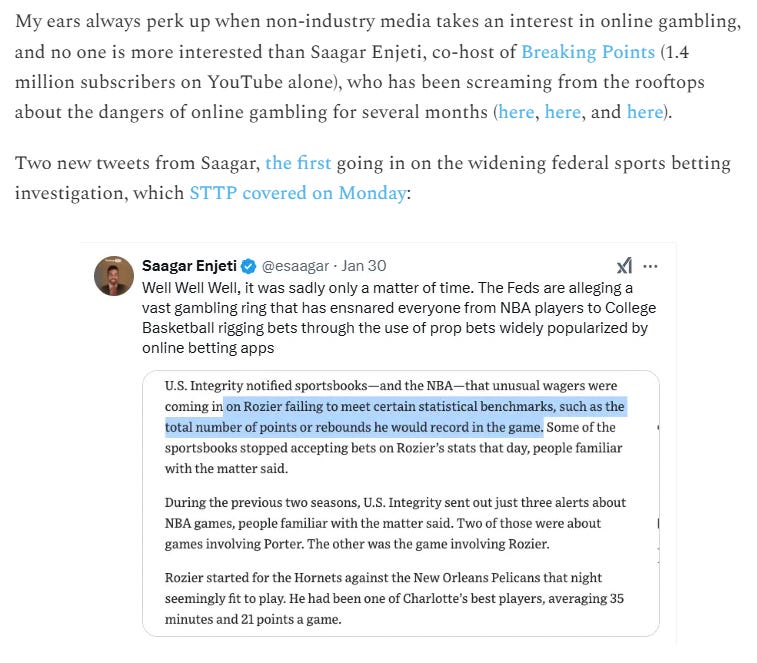Problem Gambling or Problem Narrative
A study in JAMA reveals a significant increase in problem gambling-related searches since 2021, with a 23% rise in queries like "Am I addicted to gambling?"
The Bulletin Board
THE LEDE: Making Sense of the study in JAMA on problem gambling searches.
ICYMI: ROGA’s new RG initiative; Lawmakers try to repeal federal sports betting excise tax (again).
NEWS: WSOP 2025 schedule revealed.
BEYOND the HEADLINE: Phil Hellmuth announces he will skip the WSOP Main Event, dividing the poker community.
AROUND the WATERCOOLER: Taking a gossip break.
STRAY THOUGHTS: The code of bushido.
SPONSOR’S MESSAGE - Sporttrade was borne out of the belief that the golden age of sports betting has yet to come. Combining proprietary technology, thoughtful design, and capital markets expertise, our platform endeavors to modernize sports betting for a more equitable, responsible, and accessible future.
Sporttrade is now live in their fifth state; Virginia
The Lede: Gambling Search Trends Don’t Tell the Full Story
A new study published in the Journal of the American Medical Association (JAMA) Internal Medicine shows a sharp uptick in problem gambling-related searches since 2021, including a 23% jump in people searching for the phrase: "Am I addicted to gambling?" you can read the paper here if you’re so inclined.
Searches for gambling help increased 22% in 2022, 25% in 2023, and 31% through the first 6 months of 2024, according to John Ayers, lead author and vice chief of innovation at the University of California, San Diego School of Medicine. The paper concludes that states were blinded by the dollar signs sports betting would bring in and were caught unprepared for the public health implications. "What the heck are we doing here?" Ayers said. "We have this huge health implication, and nobody's talking about it."
Reason Magazine criticized some of the findings, particularly what the data is actually telling us. I’d add that searces increasing doesn’t mean problem gambling is growing (it doesn’t not indicate that either). It could simply be that more people are using searches to ask these questions. A control, “Are alcohol/marijuana addiction searches increasing?” would probably help answer why searches have increased. Is it legalization? The plastering of helpline and problem gambling treatment options in every industry ad? Increasing usage of internet searches for medical/mental health advice?
Before I get into the legitimate critiques of the industry, I also want to address Ayer’s comment that nobody is talking about it. Everyone is talking about it. Responsible gambling and creating a sustainable industry underpin almost every internal and external conversation. The industry is making far more progress on this front than academics who love to pull alarms and then walk off whistling.
Further, the mainstream press has been all over this topic, as I’ve covered extensively in the newsletter, including earlier this week:
There is also this short list of hyper-negative from a January newsletter:
Sports betting in NC: off to a fast and destructive start (North Carolina)
News10NBC Investigates: Is mobile sports betting leading to more gambling addictions? (New York)
As legal gambling explosion puts ‘a casino in your pocket,’ CT grapples with how to protect bettors (Connecticut)
Sports gambling believed to contribute to helpline call increase in Kentucky (Kentucky)
Covering the Spread: Sports gambling and addiction in Virginia (Virginia)
Online gambling: the stakes for public health (Harvard University Forum discussion)
America Has Fallen in Love With Long-Shot Sports Bets (Wall Street Journal)
And the regular barrage coming from social media:
Ok, so what can be done about this?
I’ve offered several ideas over the years, but the simplest is to earmark a portion of a state's gambling tax revenue for problem gambling treatment and research. That said, there is a caveat: there has to be oversight. Let’s stop spending millions on pointless studies and start funding the treatment programs that are supposed to exist but apparently don’t.
Here are a few other ideas I’ve offered up:
Stop glazing useless RG/PG programs, marketing campaigns, and “findings”
Figure out what effective responsible advertising looks like
Dustin Gouker also offered some thoughts in his Closing Line newsletter this week.
Bottom line: Addiction alarmism doesn’t solve anything. The study is interesting; nothing more and nothing less.
ICYMI: ROGA’s New RG Initiative; Lawmakers Try to Repeal Federal Sports Betting Excise Tax (Again)
ROGA launches responsible gambling initiative: A new responsible gambling program aimed at young adults was launched by the Responsible Online Gaming Association (ROGA) in partnership with EPIC Global Solutions, Kindbridge Behavioral Health, and the Responsible Gambling Council (RGC) - ROGA is an industry-funded responsible gambling organization. The initiative's centerpiece is the Know Your Play website, which features digital learning tools, resources, and videos designed to “educate students on key responsible gaming concepts, including randomness, impulsiveness, and limit setting while addressing myths like the illusion of control in sports betting.”
Lawmakers introduce legislation to repeal sports betting excise tax: Representatives Dina Titus and Guy Reschenthaler, the bipartisan Congressional Gaming Caucus co-chairs, have reintroduced legislation to repeal the .25% excise tax on sports betting. The tax “does nothing except penalize legal gaming operators for creating thousands of jobs in Nevada and 37 other states around the nation,” Titus said. “Illegal sportsbooks do not pay the .25% sports handle tax and the accompanying $50-per-head tax on sportsbook employees, giving them an unfair advantage.” A concurrent effort known as The GRIT Act has divided RG proponents and the industry, as it seeks to earmark the federal excise tax for problem gambling research and treatment.
I’m not ignoring it: I’ll deep-dive yesterday’s AGA State of the Industry address, including the increasingly testy fight over sweepstakes sites, in tomorrow’s feature column.
SPONSOR’S MESSAGE - Kambi is the industry’s leading independent provider of premium sports betting technology and services. Trusted by dozens of operators worldwide, each benefitting from the power of Kambi’s global network, Kambi has a proven track record of giving partners the decisive competitive edge required to grow and outperform the market.
As the home of premium sports betting solutions, Kambi offers an expansive product portfolio that caters to the evolving needs of operators and players alike. At its core is Kambi's flagship Turnkey Sportsbook, renowned for its scalability, flexibility, and unrivaled track record of delivering world-class betting experiences globally. Complementing this are Kambi’s cutting-edge standalone products: Odds Feed+, Managed Trading, Sportsbook Platform, Bet Builder, Esports, and Front End.
News: World Series of Poker Schedule Released
The World Series of Poker has unveiled its 2025 schedule, which features a record-setting number of bracelet events. From May 27 through July 16, 100 live tournaments will be held, with buy-ins ranging from $300 to $250,000. Online events will be announced later.
For more information on the series and to see a breakdown of the full schedule, I recommend Pokerfuse.com’s coverage.
Pokerfuse’s Anuj Ajora tweeted an interesting stat: “If we exclude $25k and higher buy-in events, this is how the average buy-in looks like for WSOP series”:
2021 - $3239
2022 - $3292
2023 - $3296
2024 - $3373
2025 - $3477
Beyond the Headline: Hellmuth Skipping the Main Event
In a video posted on X, Hellmuth explained his decision, noting the most prestigious tournament in the world was now an “endurance event.”
The reaction to Hellmuth’s announcement was mixed, with many pros agreeing with The Poker Brat.
Terence Chan: “Hellmuth finally says something reasonable, and the poker world is like "no, let's throw everyone in a dungeon without food or water and prod them with flaming hot pokers and see who the best poker player is.”
Katie Stone: “Many people will say he’s being a brat. I think it’s deeper than that, tho - his view represents the majority of the potential (yes, optional) player pool! Maybe it’s time for WSOP to start thinking about the players for a change?”
Ari Engel: “More importantly, there should be a 12-hour turnaround in any/all WSOP events between the end of the day and the start of the play the next day.”
Faraz Jaka: “I agree 100% with what Phil Hellmuth says here. Ever since my serious back issues from my herniated disks started a couple of years ago, I’ve realized how brutal these 2AM+ finishes and short turnarounds are and have reduced my play volume as a result of it—not just for performance but for basic health, sleep, and life balance.”
At the same time, some, including Daniel Negreanu, don’t want the event accelerated or spread over three weeks to satisfy Phil’s concerns.
“It is a bucket list event for many, with the grind being part of the allure,” Negreanu said on X. “The WSOP main event is special because of its long-standing consistency as a: -$10k buy-in -freeze out -2 hour levels. All 3 of those things have been in place for over 50 years now.”
I disagree with that assessment. Taking two weeks off (and then needing a vacation to recover from grueling 12-hour days at the poker tables) isn’t conducive to the average person’s life.
I’d also point out that the tournament had fewer than 1,000 entrants for most of its existence, and from 1970 to 1999, it had fewer than 500.
STTP Thoughts: This is yet another case of gambling companies (and poker is especially guilty of this) listening to the vocal minority, rather than the entire customer base. They may butter your bread now, but if you’re not careful, you’re eventually going to run out of bread.
Around the Watercooler
Social media conversations, rumors, and gossip.
No rumor mill today. Not because there isn’t anything to report but because adding another section would exceed Substack’s email limits.
Stray Thoughts
“When it comes to battle, until one turns forty, he should think only of winning. After forty, he should think only of not losing.” ~ Attributed to Japanese samurai Yamamoto Tsunetomo









State regulators could publish annual data to inform public debate, particularly the total number of online actives, GGR per active, number of online actives self-excluding due to problem gambling and their GGR per active. Even better if they broke it down by age profile and also shared data on the use of responsible gambling tools. Why rely on unreliable surveys when you have hard data?
I sat on a panel a decade ago with an addiction expert who said, correctly, that young men are more likely to experience addiction issues, and then speculated, incorrectly, that they were the primary source of revenue for the online sports betting industry. I was able to share data from the UK that showed men under 25 lost about a third the amount of older gamblers.
If you just followed the money, then people at risk of compulsive gambling who lacked the disposable income to wager heavily would fly under the radar.